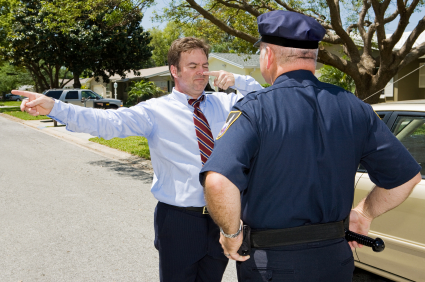Are Field Sobriety Tests Required in Colorado?

Colorado requires police to have “reasonable suspicion” to pull over a vehicle or make a traffic stop. “Reasonable suspicion” dictates that an officer must have articulable facts that the driver is committing a crime. Some of these crimes that qualify include:
- Speeding
- Rolling through a stop sign
- Having a broken tail light
- Failing to signal for a lane change
If the car in question is parked, the officer may become suspicious of criminal activity if the driver appears to be under the influence or if the vehicle smells of alcohol or marijuana. At a traffic stop, the police will often run the person’s name to see if there are any outstanding warrants, too.
Sobriety Tests in Colorado
Sobriety tests in Colorado are voluntary. This means that you can refuse to take a sobriety test if asked. However, chemical tests such as breath, blood, or urine tests cannot be refused. The results of the tests may be used as evidence in criminal prosecution.
Though there is no legal requirement in Colorado for drivers to submit to sobriety tests, if an officer has probable cause to believe that a driver is impaired, the officer may request that the driver submit to such tests. If the driver refuses to submit to the tests, the officer may arrest the driver for DUI.
Types of Sobriety Tests
The field sobriety tests that an officer may choose to give you when you are pulled over typically involve physical and mental tasks, such as walking in a straight line or counting backward from a specific number. If the person being tested fails to complete the tasks correctly, it is generally considered an indication that they are intoxicated. Types of Field sobriety tests include:
Horizontal Gaze Nystagmus Test
A Horizontal Gaze Nystagmus Sobriety test is an objective test used to help determine if a person is under the influence of alcohol. The test is based on the observation of involuntary eye movements, or nystagmus, which are exaggerated when a person is intoxicated.
During the test, the police officer will instruct the suspect to follow a small object, usually a pen or finger, with their eyes. The officer will then look for three specific signs of intoxication:
- Lack of smooth pursuit – the eyes should move smoothly when following the object. If the eyes jerk or bounce, it may be an indication of intoxication.
- Nystagmus at maximum deviation – the eyes should jerk when they are moved to the side as far as possible. If there is no nystagmus at maximum deviation, it may be an indication of intoxication.
- Onset of nystagmus before 45 degrees – the eyes should start to jerk before they are moved to the side 45 degrees. If the eyes do not start to jerk until after 45 degrees, it may be an indication of intoxication.
If the police officer observes all three of these signs, it is generally an indication that the suspect is intoxicated and may be arrested for drunk driving.
Walk and Turn Test
The Walk and Turn Sobriety Test is one of the most common roadside sobriety tests used by police officers. The test is designed to measure a driver’s ability to divide their attention between two tasks, walking and following directions. The test usually involves the officer asking the driver to walk in a straight line heel-to-toe for nine steps, turn around, and then walk back in a straight line for nine more steps. The officer will be looking for any signs of impairment, such as poor balance, swaying, or difficulty following instructions.
One-Leg Stand
The One Leg Sobriety Test is a field sobriety test used by police officers to help determine whether a driver is impaired. The test is performed by having the driver stand on one leg for 30 seconds. If the driver is unable to stand on one leg for 30 seconds, or if they exhibit any other signs of impairment, they may be arrested for driving under the influence.
Other sobriety tests include blood tests and breathalyzer tests, which can be administered on the spot, at a police station or hospital. Blood tests can measure the alcohol content in a person’s blood, while breathalyzer tests measure the alcohol content in a person’s breath. Both of these tests are generally considered more accurate than field sobriety tests, but they can also be more invasive and time-consuming.
Refusing a Sobriety Test
If you are pulled over on suspicion of drunk driving and the police officer asks you to take a sobriety test, you have the right to refuse, but there could be consequences. If you refuse the test, the officer may arrest you, and your license may be suspended. The officer may use this as an indication that you are intoxicated. Additionally, the refusal may be used as evidence against you in court. If you are convicted of drunk driving, you may face stiff penalties, including jail time, a fine, and a license suspension.
It is in your best interest to cooperate with the police. If you refuse to take a sobriety test, remember to remain calm. Simply state that you are not willing to take the test while showing the officer great respect. From the moment you are pulled over, your behaviors are watched, so remember to keep a relaxed demeanor.
Contact a Lawyer
If you have been charged with DUI, hiring a DUI defense lawyer is vital to protect your rights. The team at Whitaker & Penix, LLC are experienced defense attorneys and are capable of providing top-notch DUI legal defense. Call (970) 368-0602 to discuss your case with us.